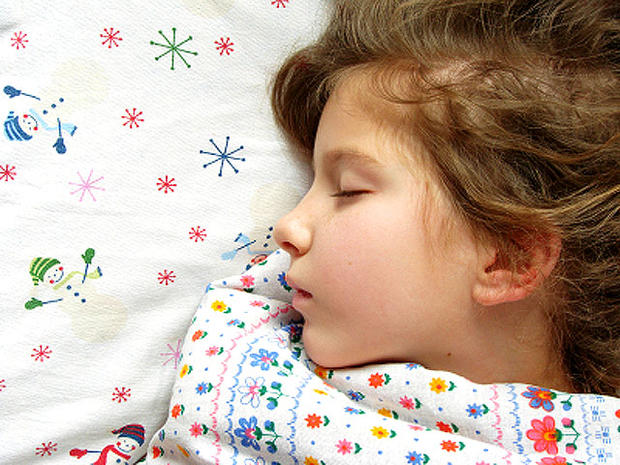Kids who snore may have higher risk of behavioral problems
(CBS News) Snoring in children may be more than a noise problem: It may lead to behavioral problems.
A study that looked at young children with persistent and loud snoring showed that those who snored loudly at least twice a week at the ages of 2 and 3 had more behavioral problems than children who didn't snore or those who snored at 2 or 3 but not through both ages.
"The strongest predictors of persistent snoring were lower socioeconomic status and the absence or shorter duration of breastfeeding," lead author Dr. Dean Beebe, director of the neuropsychology program at Cincinnati Children's Hospital Medical Center, said in the press release. "This would suggest that doctors routinely screen for and track snoring, especially in children from poorer families, and refer loudly-snoring children for follow-up care. Failing to screen, or taking a 'wait and see' approach on snoring, could make preschool behavior problems worse."
Nationally, snoring affects one in 10 children. Snoring occurs when breathing is blocked while sleeping and may indicate more serious health problems like sleep apnea, according to the Mayo Clinic.
For the study, published online in the Aug. 13 issue of Pediatrics, researchers looked at 249 children and surveyed their mothers about their children's sleep and behavioral patterns.
Out of the subjects, 170 were non-snorers, and 57 of the children snored twice a week when they were 2 or 3. Twenty-two of the kids - about 9 percent - snored more than twice a week when they were 2 and kept up the snoring through when they were 3. The snorers were more likely to have been exposed to environmental tobacco smoke prenatally and into childhood, and were more likely to be black and from a family with a lower socioeconomic status.
The consistent snorers were found to be more likely to have behavioral issues, including hyperactivity, depression and inattention. Thirty-five percent of the kids who snored at 2 and 3 were "at risk" of behavioral problems and worse, compared to 10 percent in the non-snoring groups and 12 percent in the kids who had snored at 2 or 3.
Previous research, published in March of this year and also in Pediatrics, tied snoring and mouth-breathing - dubbed
"sleep-disordered breathing" - in kids ages 6 to 7-months-old to a higher risk of developing
behavioral problems by the time they were between 4 and 7-years-old. At the time, the researchers said breathing problems during sleep may disrupt oxygen flow, resulting in problems in areas of the brain that control for regulating emotions and paying attention.
Dr. Richard M. Kravitz, medical director of the pediatric sleep lab at Duke University Medical Center in Durham, N.C, told WebMD that the new study means parents shouldn't turn at deaf ear towards their snoring kids. He added that while it doesn't mean that everyone who snores will have behavioral problems, it does put them at a higher risk.
"If your child snores, you can't say that everyone in your family does. You need to follow it up with your pediatrician," he said.
Dr. Sangeeta Chakravorty, director of the pediatric sleep evaluation center at Children's Hospital of Pittsburgh, added to HealthDay that snoring in this age group can be common, and other factors such as if the children were tired, obese, had enlarged tonsils or if they lacked oxygen through the night were not included in the study. Still, this doesn't mean that snoring should be ignored. She pointed out that snoring can impact sleep, and sleep loss impacts behavior.
"If you hear your child snoring more than three to four times a week in the absence of an upper respiratory infection [cold], and it lasts more than a month, seek help from the pediatrician," Chakravorty said.
Beebe pointed out that just because they are children doesn't mean snoring is any less serious.
"A lot of kids snore every so often, and cartoons make snoring look cute or funny. But loud snoring that lasts for months is not normal, and anything that puts young kids at that much risk for behavioral problems is neither cute nor funny," Beebe said in the press release. "That kind of snoring can be a sign of real breathing problems at night that are treatable. I encourage parents to talk to their child's doctor about loud snoring, especially if it happens a lot and persists over time."
